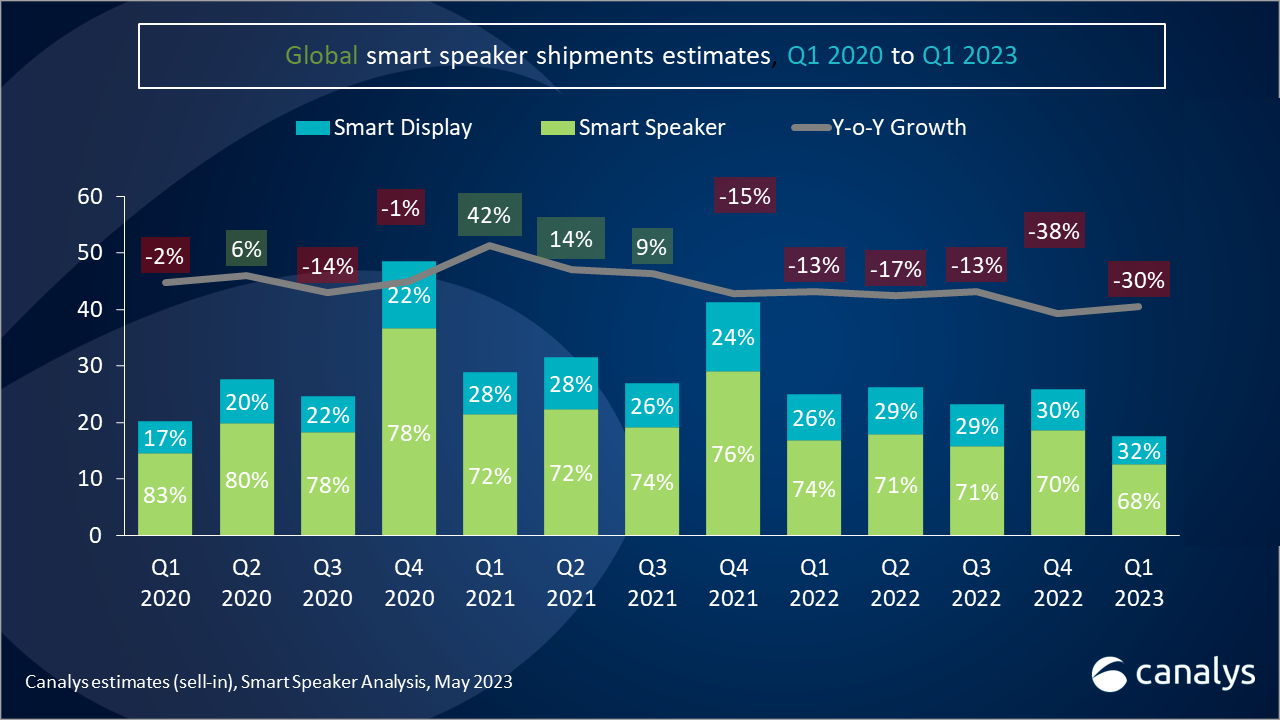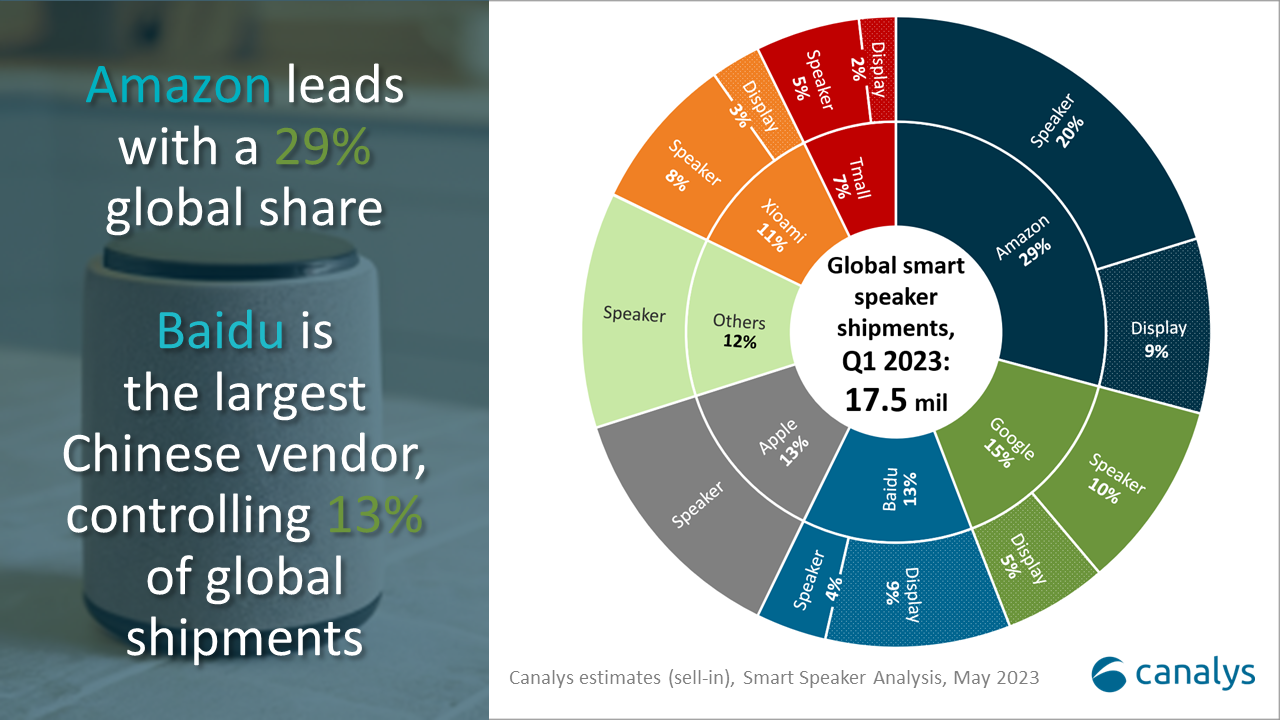Canalys Forums 2023: the Canalys Partner Ecosystem Flywheel unlocks the full potential of the channel
29 June 2023

Amid damning news from Google and declining shipments, the smart speaker market's future is in question. However, the incorporation of generative AI and chatbot abilities into voice assistants could revitalize the market. This enhancement would vastly improve smart speakers' functionality, positioning them as valuable companions within homes. While challenges remain, this development has the potential to reignite interest and drive shipment growth by 2025.

Canalys’ latest estimates show a 30% decline in global smart speaker shipments in Q1 2023, marking it the sixth consecutive quarter of year-on-year decline. Such a prolonged downturn and uncertain outlook have raised critical questions for vendors – is it worth the return on investment? Vendors have been shifting priorities, while the landscape of voice assistants is being disrupted, driven by the rise of generative AI.
The prominence of AI was evident at Google's recent I/O. Taking center stage; the buzzword was mentioned over 100 times during the event, with numerous new services announced and continued developments to Bard. Assistant was scarcely discussed, suggesting a potential shift in priorities within Google's ecosystem. This has been compounded by the stripping of voice assistant apps, games and some third-party apps from Nest hub devices during Q2 2023.
Google also presented the inaugural Pixel Tablet, which is equipped with a magnetic charging speaker dock, communal user interface and Google Home. The Pixel Tablet was reminiscent of a smart display (according to Canalys definitions), displaying a shift in Google’s perception that the communal device in the home will be a docked tablet, rather than a simple display. Hardly a glowing review of smart displays when the second largest smart speaker vendor globally (15% shipment share, Q1 2023) releases a tablet alternative in favor of a new Nest Hub model.
The increasing emphasis on generative AI over voice assistants and Google's reimagining of the next smart display adds fuel to the already burning uncertainty over the future of its commitment to the smart speaker market.

Voice assistant users express dissatisfaction with issues such as misunderstood commands, random activations, and unprompted responses. These challenges further compound concerns for the future. The command-and-control system voice assistants use are no longer smart or practical by today’s generative AI standards.
Voice assistant embedded smart speakers are crucial for smart home interoperability by acting as an effective central hub for controlling various smart home devices. This use case gives smart home vendors a strong motivation to invest in the development of improved voice assistants. Furthermore, enhancing the cross-functionality of AI-powered voice assistants also positions vendors to capitalize on the growing adoption of voice-first technologies in other domains, such as the automotive market. Leveraging the capabilities of voice assistants unlocks a myriad of additional use cases across various industries, further expanding the potential market reach for vendors.
Advancements in speech recognition, natural language processing, and large language models vastly improve voice assistants' functionality and user experience. Generative AI can provide voice assistants with a far superior cognitive understanding of user intentions. By allowing assistants to access chatbot’s extensive knowledge and capabilities through language models, generative AI features can be used as a back-end service for assistants. This enables assistants to perform complex tasks, engage in meaningful conversations, and deliver accurate responses. These advancements can transform voice assistants into indispensable virtual companions that provide convenience and companionship, exceeding the currently limited capabilities and overcoming frustrations voiced by users.
Amazon has started adding chatbot-like abilities to Alexa. Amazon’s in-house large language model ‘Alexa Teacher Model’ is being used to add conversational capabilities and improved functionality to Alexa. Dave Limp, SVP of Devices & Services at Amazon, is reported as saying shortly after their Q1 earnings call that this should bring a ‘dramatically different experience’. Additionally, Amazon is actively developing a larger and more generalized voice assistant model, as CEO Andy Jassy informed investors in May 2023. The objective is to create more versatile and interoperable capabilities for a smarter voice service, that extends beyond the confines of the home.
Simultaneously Chinese vendors have sped ahead with voice assistant development. The three main smart speaker vendors in China (Baidu, Tmall and Xiaomi) have made noteworthy strides. These companies announced initiatives to integrate large language models into their respective voice assistants. Baidu appears to be leading the way with its comprehensive 'Wenxin Yiyan' model, which forms the basis of the AI platform 'Xiadu Lingji.' This platform serves as a multi-functional assistant and intelligent housekeeper. Tmall's Genie assistant has been linked to Alibaba's Tongyi Qianwen which launched in April 2023. And Xiaomi expressed an intention to incorporate the Xiao AI assistant with extensive model capabilities. These vendors represent 95.1% of China's smart speaker shipments (Q1 2023), showcasing a substantial commitment to upgrading voice assistants for the Chinese market.
Apple stands out as it operates within and outside China. However, with major competitors in each region making progress in incorporating AI into voice assistants, Apple may find itself compelled to respond. Apple's AI strategy has primarily focused on incorporating "Machine Learning" into its services and tools rather than generative AI. The Vision Pro includes Siri as a navigational tool demonstrating a continued commitment to its under-performing assistant. Leveraging generative AI to enhance Siri’s performance is expected to greatly improve the user experience on future devices.
Despite the promising advancements made by vendors in incorporating generative AI into voice assistants, they face significant hurdles along the way. These challenges will impede the widespread adoption and success of voice assistants in the following ways:
Vendors can revitalize interest in smart speakers and drive market expansion through effective integration of generative AI into voice assistants and the simultaneous resolution of associated concerns. The incorporation of generative AI will lead to enhanced user experiences, meeting the long-standing demands of consumers. Canalys predicts a return to shipment growth (8%) in 2025 due to the implantation of generative AI. However, addressing persistent issues such as data privacy and security is imperative. Without the incorporation of generative AI, the smart speaker market will fade to a niche market.